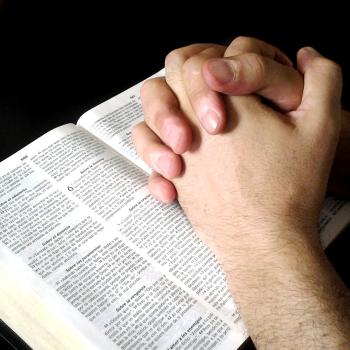I can honestly say that I don’t have any enemies. I don’t hate anyone and I wish no harm on anyone. I genuinely like people and work very hard to see the best in everyone.

Image via Pixabay
I mean, sure, there are some people that I like better than others.
And hey – I don’t get along amazingly with everyone. I’m only human.
And yes, if I’m being honest, there are certain people that I don’t always love being around.
Look, are there people whose opinions drive me crazy? Of course.
And certainly, there are some who I wish wouldn’t do what they do or say what they say.
Fine, I do sometimes vent to my wife about people behind closed doors.
And alright, there are those whose worldview and outlook I find alarming.
And although I can’t begin to imagine how it’s possible, my years of ministry have taught me that some people actually don’t like me. Like, at all. Like, a “We’re quitting the church because we don’t like you”-level of dislike.
And also, whether I consider them enemies or not, there are indeed people and cultures and nations out there who probably think ill of me/us.
And so – if I define “enemies” as “people that I hate/wish harm upon,” it’s pretty easy to dismiss the idea of having enemies and think that I am above it all.
But if I expand the definition to include “people who frustrate me/hold different opinions/get me angry/drive me crazy sometimes/don’t like me/etc.” then there certainly are such people in my life, and no doubt in all of our lives.
If we reconsider the word “enemy” to include “the frustrating,” “the unlikable,” or even “opponents,” it gets much easier to see. We have those people at work, even in our families. We have political opponents, those with opposing worldviews, opposing personalities, and goodness knows, opponents amongst our fellow Christians.
Our enemies are the people on the other side of the line of “us,” who we consciously or unconsciously count as “them.” Almost always, we feel superior to them. Almost always, we hold things against them. Almost always, wherever we can, we pull away from them.
And to this most common attitude, Jesus teaches us this instead:
“You have heard that it was said, ‘Love your neighbor and hate your enemy.’ But I tell you, love your enemies and pray for those who persecute you, that you may be children of your Father in heaven. He causes his sun to rise on the evil and the good, and sends rain on the righteous and the unrighteous. If you love those who love you, what reward will you get? Are not even the tax collectors doing that? And if you greet only your own people, what are you doing more than others? Do not even pagans do that? Be perfect, therefore, as your heavenly Father is perfect.” (Mt 5:43-48)
So, the most important thing that I can see from this passage is this:
When we love our enemies, we are children of our Father in heaven.
Disliking/hating/harming our enemies is one of the most natural instincts that we have. We start doing it as children, most naturally. It’s the easiest thing in the world to do. We don’t even need to try at it. Loving our friends and family is easy, and disliking our enemies is equally easy.
But Jesus also notes here that we get no extra credit for loving our loved ones – literally everybody does this, even those who are far from God.
As those who are walking with God, what we are called to is significantly more difficult – to love everyone, even our enemies, just as we love our loved ones.
And when we do this, Jesus says that we are children of our Father, who, by the way, also sends His blessing on His enemies, taking care of both the righteous and the unrighteous. Our Father, who loved the people who were His enemies, and sent His Son to save them (Jn 3.16; Rom 5.10). We are reminded of Jesus, being killed by the very ones He came to save, nonetheless interceding for them, asking God for mercy on their behalf (Lk 23.34).
When we love our enemies, we are like the Father; when we love our enemies, we are like the Son.
What is our practical application of this? Of course, it will depend on the context. It certainly does not mean that we need to stay close to an abuser or that we should not have healthy boundaries with those who have a history of causing pain in our lives.
It also doesn’t mean that we are silent or passive in the face of injustice or evil.
But Romans 12.21 says, “Do not be overcome by evil, but overcome evil with good.” Whatever it is we are facing from our opponents, we do not return in kind. We seek to rise above, to react and respond with what is good instead.
So when we are persecuted, we pray for the ones doing the persecuting. When we are spoken ill of, we speak well of the speaker, or we remain silent if we can’t do that. We turn off the gossip and slander against another’s reputation behind their backs, regardless of how they are holding our reputation. When we are met with anger, we respond with peace. When we are facing hostility, we seek to disarm. We return blessing for cursing. We do not push away (with some exceptions, such as in the case of abuser), but we welcome in. When appropriate, we give generously, and always, we are called to forgive.
We choose the loving path, which is often the harder path. We choose the loving path, because it is the right path. We choose the loving path in order to obey Jesus. We choose the loving path in hopes that our actions will disarm our enemy, and possibly turn them into a friend. We choose the loving path because it is the Christ-like path, and that is reason enough.
We choose this loving path, because when we do, we are marked as children of our Father in Heaven.
********
If you’re enjoying what you read, you can follow Third Way Christians on Facebook or Instagram, or sign up to get new columns emailed to you here! As well, you can track along with Chris’ church teaching at Meadow Brook Church’s YouTube page!












